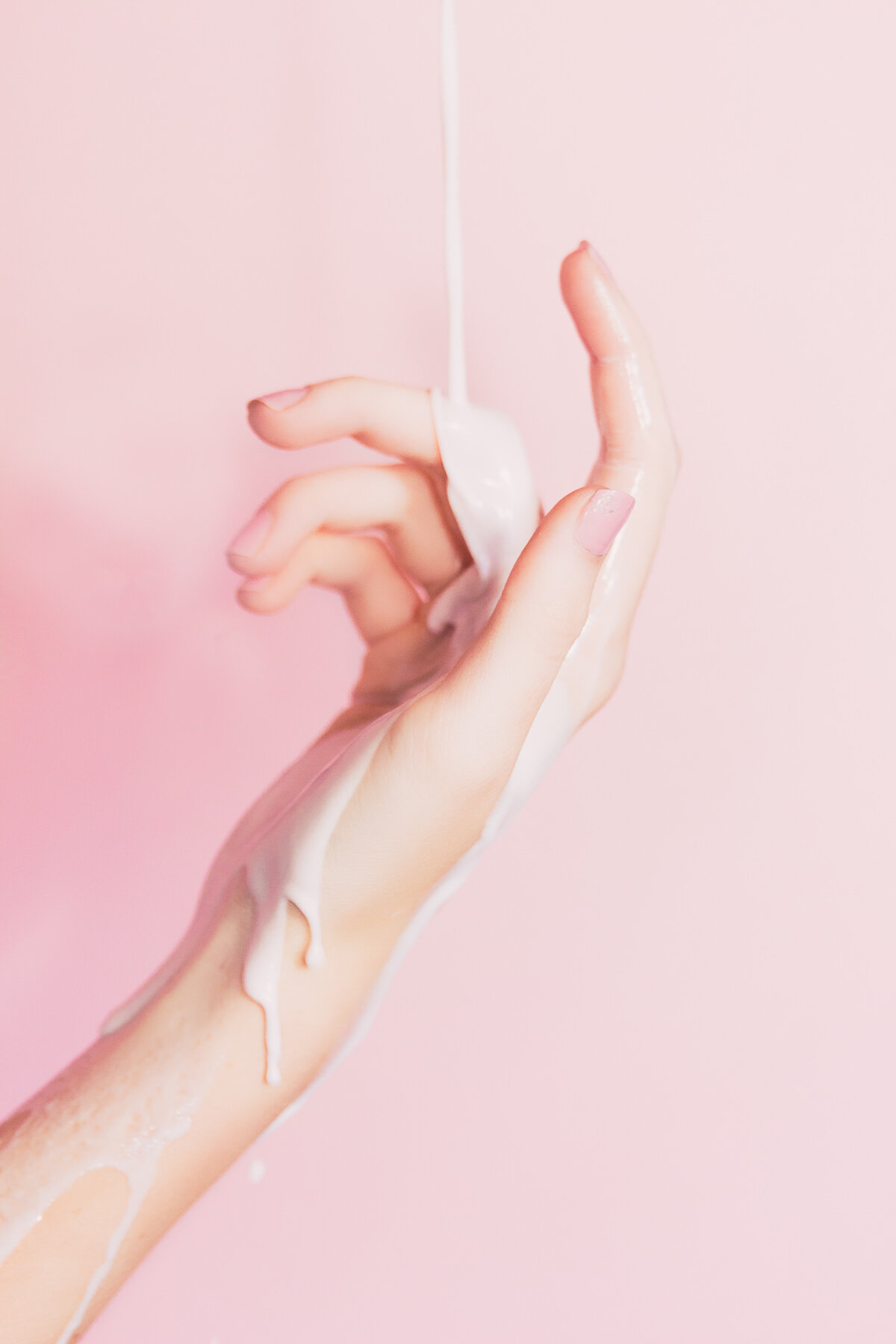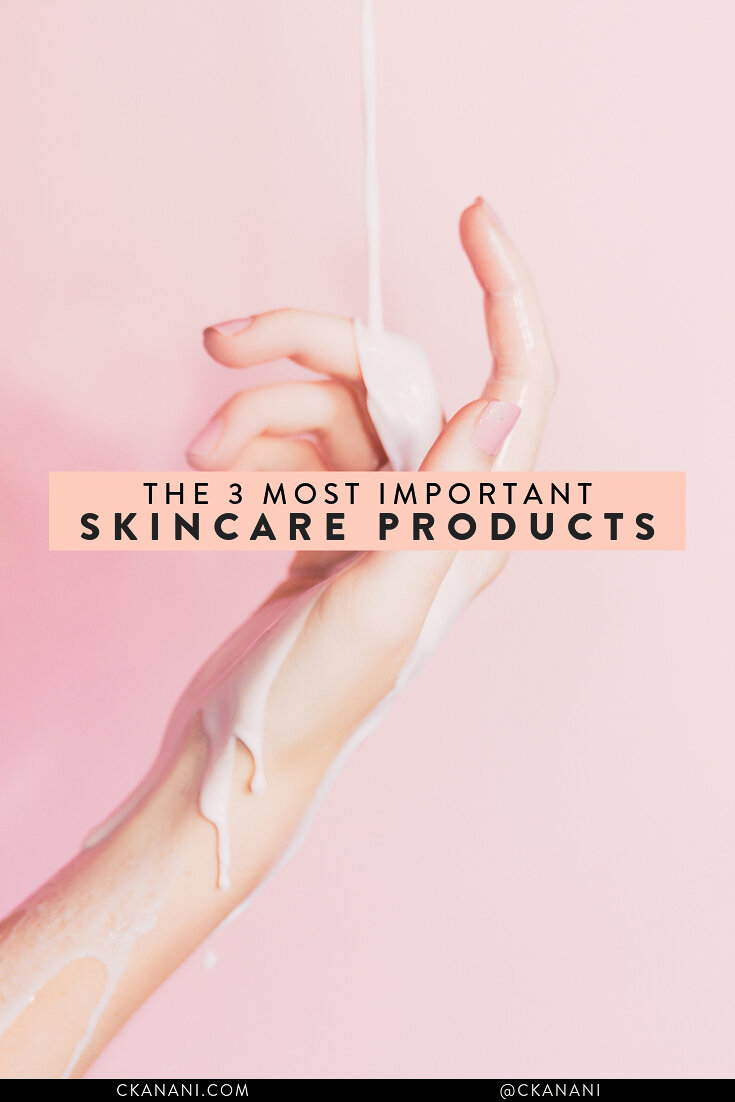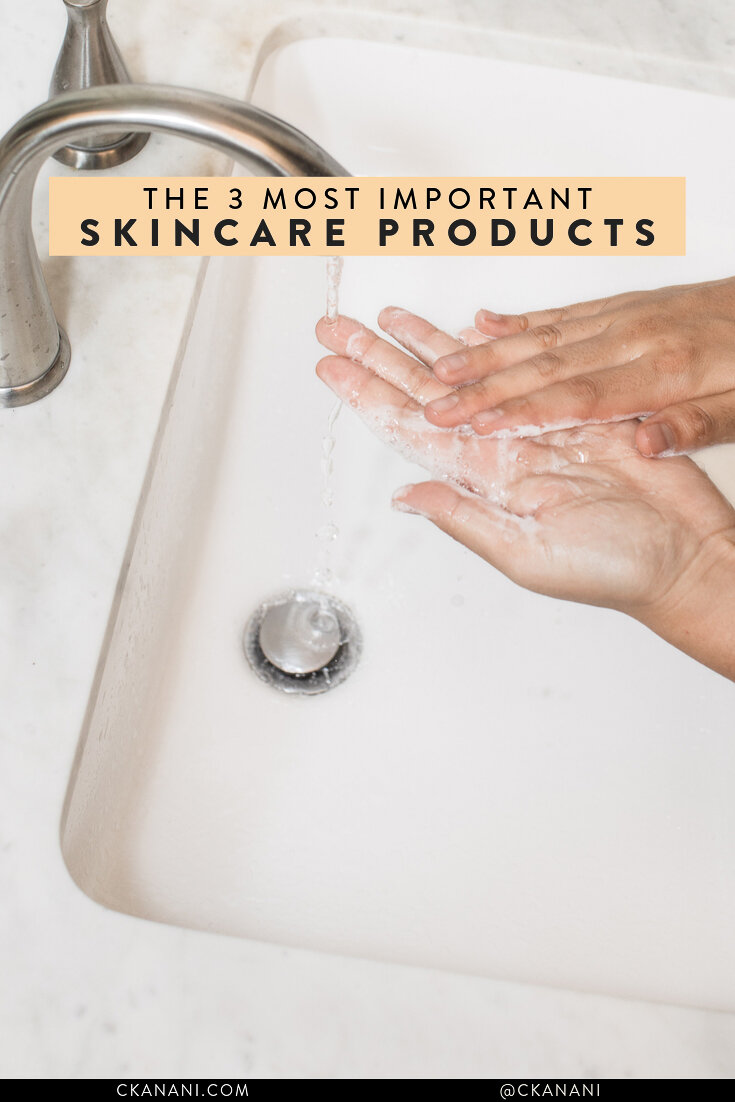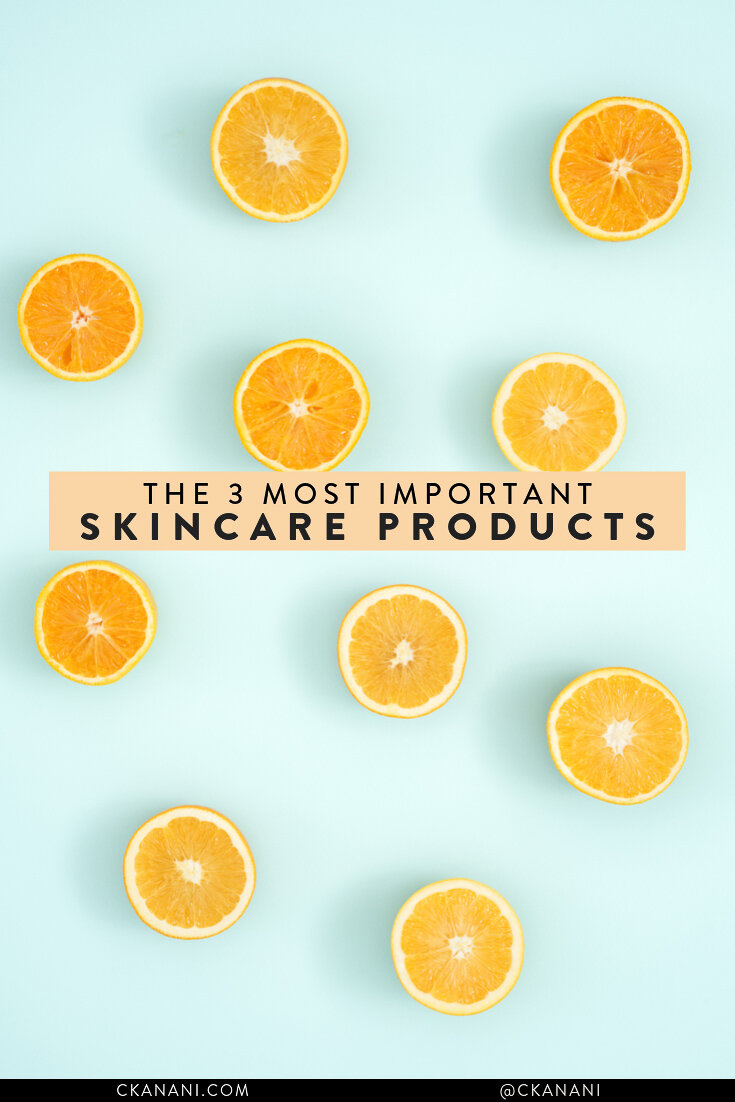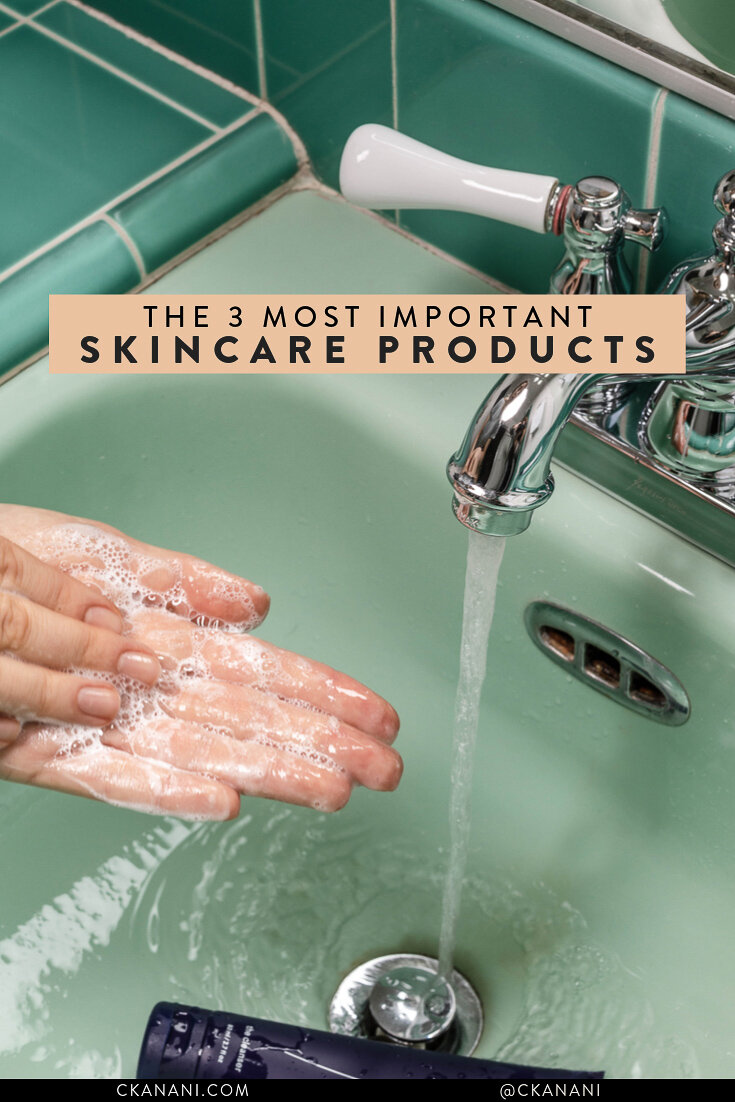The 3 Most Important Skincare Products (And Why)
If you follow me on Instagram then you know I talk a lot about skincare. I first learned about preventative skincare when I started going to a fancy cosmetic dermatologist around the age of 25. She introduced me to medical grade products, including my favorite skincare brand SkinCeuticals, and I haven’t looked back since!
After seeing very clear results, I became obsessed with learning more about the science behind it. Why should I (or anyone else) buy a $168 serum when there are other vitamin C serums for less than half claiming to do the same thing? What makes medical grade products so superior?
These days I get a direct message on Instagram asking about skincare at least a few times per week. I usually spend a fair amount of time going really in depth (I geek out on skincare, clearly) and at the end of the convo there’s almost always the same question: if I was to buy only a few skincare products, which should I buy?
Now I’m not a dermatologist, nor am I an esthetician, but I do very confidently know the answer to this common question. I have heard it from my dermatologist, from the dozens of estheticians I follow online, and seen it first hand on myself over the past seven years.
So if you too are wondering where to start, what is the most important, and why they are the most important — this one is for you!
UPDATE: I HAVE A SKINCARE SPECIFIC INSTAGRAM NOW! Click here to follow @skincarethatilike
The 3 Most Important Skincare Products:
Vitamin C Serum
Vitamin C, often referred to as the holy grail of skincare ingredients, is one of the most powerful and effective antioxidants in existence. Just like vitamin C is great for overall wellness (hello, Emergen-C), it is an essential step in any skincare routine. It is the main thing I credit my so-called great skin to.
But what exactly makes vitamin C so worthy of being called the holy grail skincare ingredient?
It protects you from the environment (free radicals caused by sunlight, cigarette smoke, and pollution)
It reduces visible signs of aging (the appearance of fine lines and wrinkles, loss of firmness)
It is brightening
It improves an uneven skin tone and prevents skin discoloration
It promotes collagen production
Sounds amazing? It is. And because vitamin C has so much buzz around it, everything, or so it seems, contains it now — products at Sephora, products at department stores, even products at the drug store. But before you go running to the store to grab a vitamin C product, it is incredibly important to know that not all vitamin C products are created equal.
For as great as vitamin C is, it’s also very tricky. It goes bad incredibly quickly, it destabilizes the second it comes into contact with the air, it can be ineffective at penetrating the skin, etc. So if you see something inexpensive that touts vitamin C, just know that it’s likely a marketing scheme and not going to have any of the above benefits. I don’t personally like to waste my money which is why I stick to medical grade skincare backed by proven science.
Important side note: cosmetic products like those found at beauty stores or drug stores contain ingredients that only work on the skin’s outer most layer (the epidermis). They are not permitted to affect structural change to the skin. This can be fine for short-term needs, in my opinion, but if you want something that is truly preventative and will have an effect in the long run, you need to use medical grade products which actually penetrate the skin.
There are also several different kinds of vitamin C (pure vs. derivatives), and again, not all are created equal. Ascorbic acid is said to be the best. It’s proven to be the most effective at penetrating the skin and it has the highest potency when applied topically. You should avoid antioxidants formulated with vitamin C derivatives like ascorbyl palmitate, magnesium ascorbyl phosphate, and sodium ascorbyl phosphate.
If you’re a nerd like me and want to get even more technical, the Duke Antioxidant patent states that the following formulation parameters are required for effective delivery of vitamin C to skin:
Pure l-ascorbic acid (vitamin C)
An acidic pH within the 2.0-3.5 pH range
A concentration between 10%-20%
The vitamin C serum I personally use is SkinCeuticals C. E. Ferulic. When it comes to skincare, there is no product I recommend more. I have been using it religiously for at least five years and it is the product that has had the largest impact on my skin. Click here to check it out.
Don’t just take my word for it though. It’s a cult favorite amongst the entire beauty community, has won tons of awards, is the number one vitamin C seller on Dermstore, and is backed by proven science. I cannot stress that enough. There is no doubt this product is effective because it is backed by actual proof which means you will not be wasting your money.
And speaking of money, this serum isn’t cheap. But it is effective and it is powerful. In fact, it is, according to their site, the only brand to formulate antioxidants according to the above mentioned parameters required to effectively deliver vitamin C to the skin! And because it is a highly potent medical grade product, you only need to use 4-5 drops of it every morning. Just 4-5! That’s nothing. So while it might be more expensive than other options, it will last longer which makes it cost basically the same thing. Plus it actually works… Have I mentioned that yet?!
So what the heck is SkinCeuticals C. E. Ferulic and why is it so great? The name stands for vitamin C (C), vitamin E (E), and ferulic acid (Ferulic) - C. E. Ferulic. It contains 15% pure L-ascorbic acid, 1% vitamin E, 0.5% ferulic acid, and a pH below 3.5. Vitamin E and ferulic acid are both antioxidants and it’s been scientifically proven that the three combined protect the skin better than vitamin C alone. The latter two also help to keep the vitamin C stable. Once it is absorbed, this serum remains effective for a minimum of 72 hours.
When it comes to anti-aging, there is nothing better! Give it a try if you have not already. Click here to shop C. E. Ferulic from an authorized reseller.
If you have oily skin, you might want to check out their other best selling vitamin C serum, Phloretin C. F. Click here to learn more.
Important note: buying these products from an authorized reseller is INCREDIBLY important. Do not buy this on Amazon or anywhere else that is not an authorized reseller. Counterfeit formulas not only often have diluted formulas but they can be dangerous to your health. No joke - this woman fell into a coma after using a tainted wrinkle cream. All of the products I have linked are from verified authorized resellers.
Retinoids
Retinoids are another skincare superstar. When I first started going to that fancy cosmetic dermatologist years ago, one of the first things she asked was if I was using Retin-A. When I said no, she immediately wrote me a prescription for it.
It’s not just her, either. You’d be hard pressed to find anyone in the industry who doesn’t agree it’s an essential part of any skincare routine. Retinol is one of the most widely researched and proven skincare ingredients available today.
So what is so great about retinoids?
They are anti-aging
They improve uneven skin tone
They promote cell turnover
They improve the appearance of fine lines and wrinkles
They improve the appearance of blemishes
Retinoids come in many different forms. Retinoid is actually an umbrella term used to describe an entire category of topical medications that are derived from vitamin A. Retinol and Retin-A, for example, are two types of retinoids.
Retin-A is a powerful, potent retinoid available only as a prescription. It’s also sold under the generic name tretinoin. It’s a great idea to request a Retin-A prescription from your dermatologist, especially if you are under the age of 30. This is because many insurances will almost fully cover the prescription until then. Even at full price, Retin-A is the retinoid my dermatologist recommended to me.
Retinol on the other hand is available over-the-counter, both in medical grade skincare and cosmetic. But just like with vitamin C, I would strongly question the quality and quantity of the retinol in non-medical grade options.
Do note that retinoids can cause irritation and almost always require a ramp up period. Even while ramping up you can expect redness, flaking, dryness, itching, and other fun side effects!
In addition to the different types of retinoids, they also come in various textures (cream, gel, ointment) and strengths (0.3%, 0.5%, 1%, etc.). This is yet another reason why it’s a good idea to consult a dermatologist when choosing the one that’s right for you!
I personally spent years (literally years) trying to ramp my skin up on Retin-A with no luck. My skin, which is dry in nature but not sensitive, just could not handle it. And I tried everything — cream, gel, different strengths — you name it.
So unlike my dermatologist, I actually recommend something over-the-counter instead, based on my own experience. And my recommendation is from SkinCeuticals, of course! No, this isn’t sponsored, I just really do love their products.
SkinCeuticals’ advanced retinol creams are enhanced with the latest delivery techniques, designed to provide maximum efficacy. They claim they’re formulated to minimize the typical retinol irritations, and from my experience that is the truth. My skin tolerates their retinol much better than any of the prescriptions I tried.
SkinCeuticals retinols are available in three different strengths — 0.3%, 0.5%, and 1%. If you are new to retinol you should start with SkinCeuticals Retinol 0.3. It is designed specifically for first-time users as a prerequisite to SkinCeuticals Retinol 0.5. Click here to see the latest prices.
Once you have ramped up on Retinol 0.3, you can then move onto Retinol 0.5 (click here for that) and eventually Retinol 1.0 (click here for that). If you have used retinoids before you may be able to start with one of those instead.
UPDATE: I just tried out a full bottle of one of Shani Darden’s retinols and loved it. If you aren't familiar with Shani, she's a celebrity esthetician and the secret behind Hollywood's most flawless faces like Jessica Alba, Lea Michele, Chrissy Teigen, Marianna Hewitt, and more. A few months back after going down a cyber stalking rabbit hole I decided to buy a bottle of her Retinol Reform to find out if the hype was true. And it is! I loved it more than I even expected I would and just bought another bottle.
Broad Spectrum Sunscreen
Last but certainly not least, sunscreen. I used to think that this was something everyone knew and did without question, but I have recently learned it’s not. Even my own sister just told me she never puts SPF on her face (gasp). So let’s talk about it.
To put it bluntly: SPF is something that needs to be applied every single day. Every. Single. Day. Even during winter, even while driving in the car, even if you are staying inside all day.
Why? Because UVA rays (the ones that cause wrinkles) penetrate through windows and through fluorescent bulbs. The only way that you can completely avoid them is if you are sitting in a dark room with literally zero light. Otherwise, like it or not, your skin is receiving UV radiation. And an estimated 90% of skin aging is caused by the sun.
Even without sun, like in many places during the winter, UVA rays (again, the ones that cause wrinkles) are basically the same strength year-round. So while UVB rays can be weaker (the ones that cause sunburns), UVA are not. So wear SPF daily if you don’t want to look like a wrinkled prune, ok? :)
If you aren’t interested in the anti-aging aspect, you still need to apply SPF everyday to protect yourself against skin cancer. Skin cancer is no joke.
So now that we all agree with the importance of applying SPF daily, we’ve got to address one more important piece: sunscreen is a step in your skincare routine. An entire step of its own, meaning it is not sufficient to only use a foundation (or similar) with SPF in it.
There are two reasons this isn’t sufficient. First, because it’s almost impossible for you to apply enough SPF this way. I have read differing things, but it would take something like 7 to 15 layers to receive proper protection. Can you imagine using 15 times the amount of foundation you already use? Me either, that’s just crazy.
The second reason is because of the type of protection it provides. Remember those UVA and UVB rays? In order to protect yourself from both, you need what is called broad spectrum SPF. Makeup with SPF in it almost always only includes protection against UVB radiation, so even if you could somehow find a way to apply enough protection, you’d only be protecting yourself from one type of radiation.
So what products should you use? There are tons of great options! One of my favorites is SkinCeuticals Physical Fusion UV Defense SPF 50. It is incredibly lightweight and has what they call a universal tint to enhance your skin tone and boost radiance. Because of the tint, on many days I don’t apply anything to my skin (no makeup) after it. It’s also incredibly reasonably priced, especially for a SkinCeuticals product! Click here to see the latest prices.
Do note that this is a sunscreen and not a moisturizer. There is a difference!
If you prefer no tint, they have that, too. Click here for that.
My number one favorite is EltaMD UV Clear Broad-Spectrum SPF 46. It’s the most-loved sunscreen at Dermstore, so much so that they have an entire blog post about it being the number one item in sun care. It’s also on their list of 9 products that constantly sell out (along with my ride-or-die C. E. Ferulic), so click here to check availability and try to get your hands on it!
There’s also a tinted version for those of you who also prefer that. Click here to check pricing and availability.
Reapplication is important, too. I personally love the Colorescience Sunforgettable® Total Protection™ Brush-On Shield SPF 50 for this purpose. Click here to see the latest prices.
Like this post? Please save it on Pinterest!
Read Next:
My Morning Anti Aging Skin Care Routine
How to Get Shiny Hair - The Best Healthy Hair Products and Tools
My Natural Everyday Makeup Routine
Tips for Glowing Skin: Make Your Face Glow With the Best of K-Beauty
16 Skincare Items You Need to Add to Your Winter Routine










